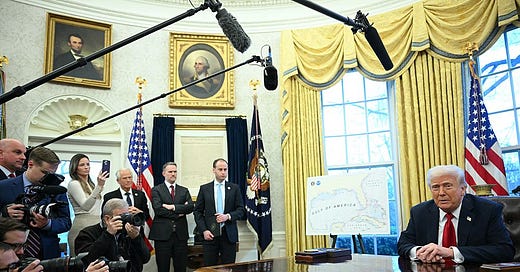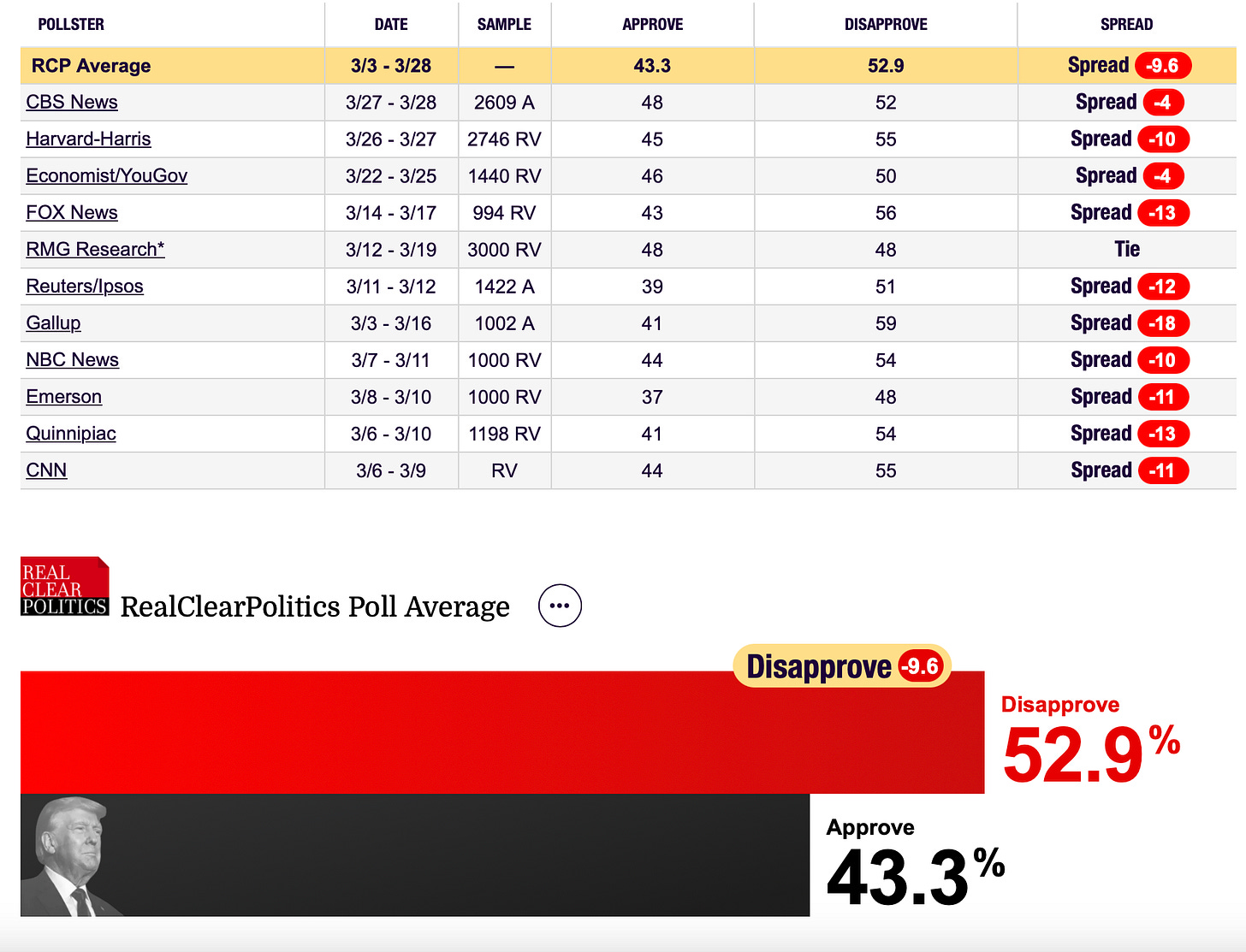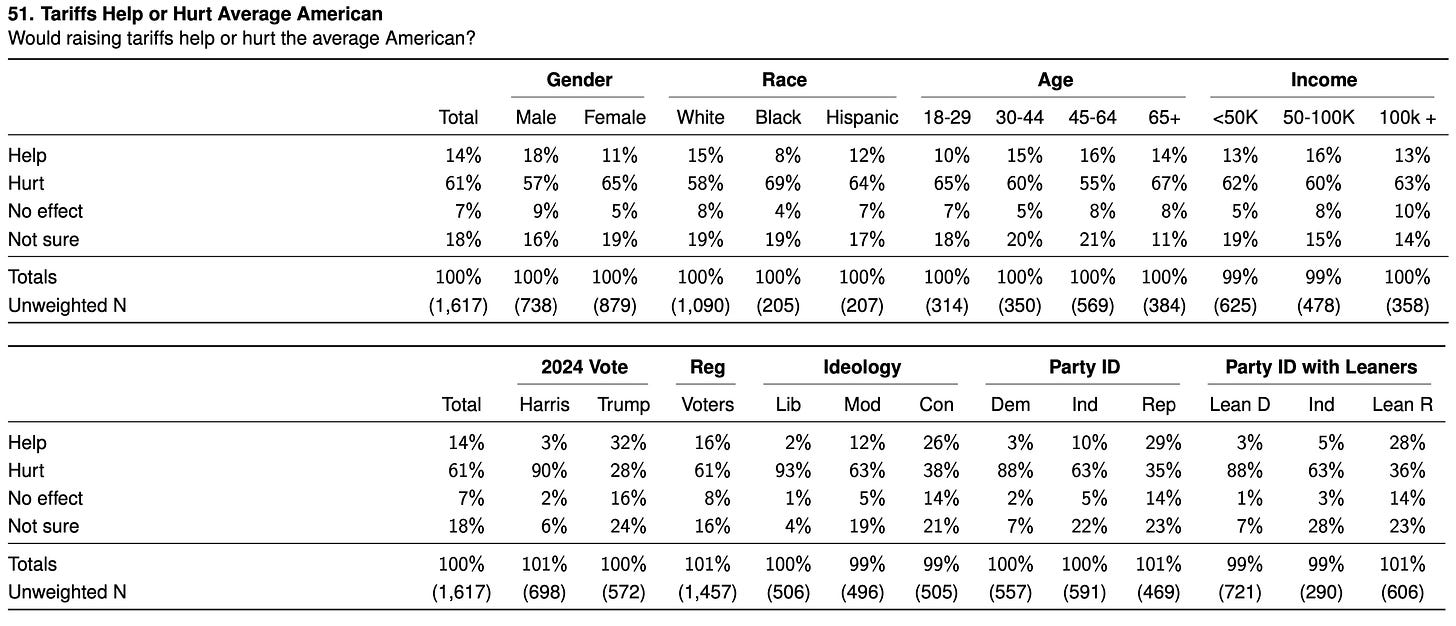Is MAGAnomics Headed the Way of Bidenomics?
Voters have already soured on Trump’s handling of the U.S. economy.
It took Joe Biden until around October 2021 to receive consistently negative job approval ratings for his handling of the economy where he stayed for the remainder of his term. Donald Trump reached negative territory on the economy with voters within the first two months of his second time in office.
This is quite a turn of events given Trump’s previously strong standing on the economy. The economy was by far the single most important issue in the 2024 election, and throughout the entire presidential campaign voters reflected more favorably on Trump’s handling of the economy when he was president than they did on Joe Biden’s economic stewardship during his tenure. Among the 39 percent of 2024 voters who said the “the economy and jobs” was the most important issue facing the country (18 points higher than “immigration” in second place), Trump won 61 percent of the vote to Harris’s 37 percent, according to AP VoteCast.
The overall economy and, more specifically, inflation and the high cost of living remain the most important issues to voters today. Yet evaluating the actions of the Trump administration so far, voters by and large do not look favorably on his economic management. As RealClearPolitics tracking on the economy shows, only 43 percent of voters on average approve of Trump’s handling of the economy versus 53 percent who disapprove.
Partisan polarization on the economy (and other issues) is a well-documented trend in American politics, something that continues with the new administration. According to most polls, around nine in 10 Republicans currently approve of Trump on the economy while a similar number of Democrats disapprove. The rub of it comes with the non-partisans. Notably, independents are particularly negative on Trump—more than half of political independents disapprove of his handling of the economy compared to less than four in ten who approve, according to recent Navigator research.
Trump’s handling of cost-of-living issues garners even greater disapproval from independent voters than does his handling of the overall economy—net disapproval on inflation among independents is at -28, according to the Navigator polling. Even some Republicans seem less enamored of Trump’s performance in dealing with inflation than they do with his presidency overall. Trump is at +80 overall net job approval with Republicans but only at +63 on inflation. “Not-so-strong” Trump voters from 2024 clock in at +35 on the measure. This is not a ringing endorsement from less enthusiastic backers from the last campaign who helped put Trump in office.
Trump’s difficulties on the economy and cost of living are compounded by his unpopular approach to tariffs. Polling on tariffs varies widely depending on how the question is worded and whether potential impacts are mentioned. But in the most basic test of whether voters believe raising tariffs would help or hurt average Americans, voters overwhelmingly say tariffs hurt average people—61 percent of voters believe this in recent Economist/YouGov polling. Only 14 percent of voters believe raising tariffs helps average Americans.
Even though some leaders of organized labor such as Shawn Fain of the UAW have come out in support of Trump’s tariffs, the reality is that most working-class voters are not in protected labor jobs such as the auto industry and instead face potential job losses and higher prices from indiscriminate tariffs and inevitable retaliations from other nations. If you’re a dockworker, a farmer, a trucker, or some other non-union working-class American (the vast majority of workers), the threat of a new tariff war surely focuses the mind on how the ideological agenda of the president affects your bottom line in terms of employment, pay, household costs, and retirement savings. Although there are potential benefits for domestic manufacturing and job creation from a genuinely strategic economic nationalism (with bipartisan congressional support), Trump’s “I couldn’t care less” mentality is not winning converts for his tariff regime. On top of this, widespread cuts to government workers and benefit programs, assaults on federally-funded science and technology research, potential big new tax cuts for the wealthy, and increased budget deficits make the entire Trump economic approach look like a bad deal for many Americans and the national economy.
So, while Trump and his team declare “Liberation Day” on tariffs, workers and other middle-class Americans are likely to maintain their skepticism of his economic model and withhold their political backing. Trump has plenty of time to right the ship and regain public support on the economy. That first requires some clear-eyed examination of his own policy agenda and why many Americans have already turned away from MAGAnomics just as they did with Bidenomics.








If tariffs do in fact result in more good manufacturing jobs coming back here, I am in favor. As a practical matter though, the electorate does not focus on the long term, so if there is short term pain he will either have to retreat on the idea, or risk dealing with a Democratic House and possibly Senate for the last half of his term. That could happen anyway, but certainly will if the economy isn't strong. As for me, I am taking a wait and see approach on the tariffs, neither an advocate or a critic, yet.
Trump (and Musk's) problem is that they clearly don't know what they're doing--an ironic parallel to many of Biden's worst decisions. It's a persistent intellectual laziness when it comes to issues they aren't familiar with. Trump clearly doesn't understand how protectionism is supposed to work, Musk obviously doesn't know about the legal frameworks for dealing with changes in government expenditure, nor does he seem to care about reducing it in anything but a reckless fashion--it's all just shooting from the hip, and in the cases where the law is being skirted, hoping that the courts don't catch up.
Not all their ideas are bad, and the Democrats could benefit from borrowing a page from them--having a DOGE is a great idea, and smart forms of protectionism that account for the complexity of modern globalized trade networks could do some good, and indeed did do some good under Biden. The border should be kept under control. (and you don't need to go all gestapo to do it) But, populist "don't believe the elites!!!" aside, you should try to listen to people who know what they're talking about. A hard thing to do, I suppose, for the extremely rich, who are insulated from the effects of policy failures--but not impossible, given some diligence. (see: Warren Buffet, Ray Dalio)